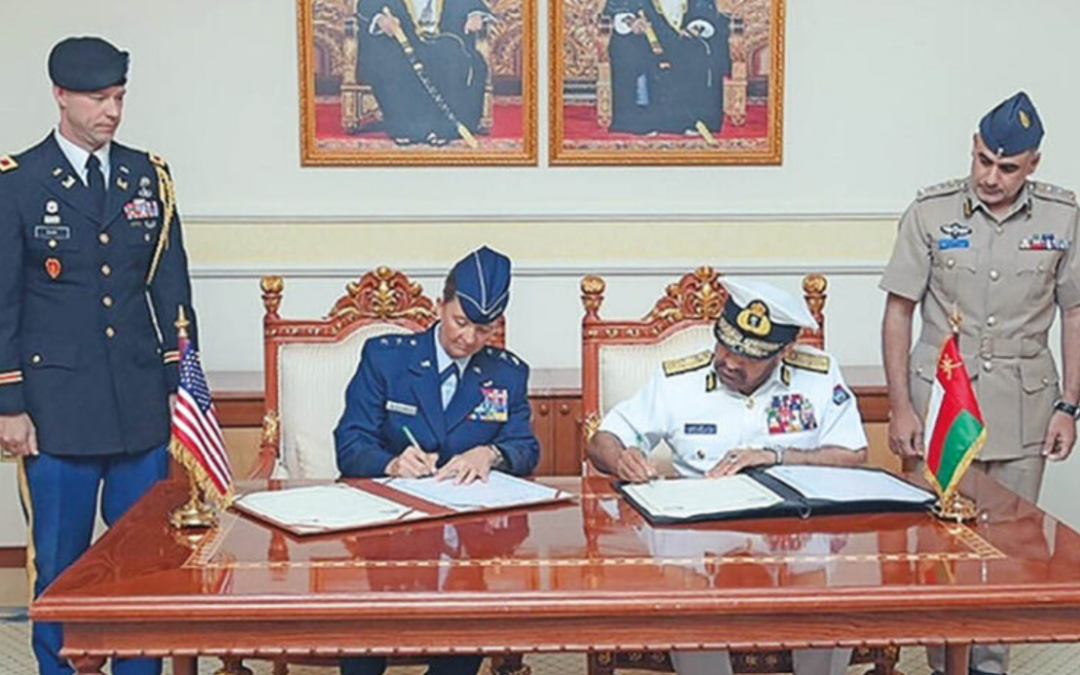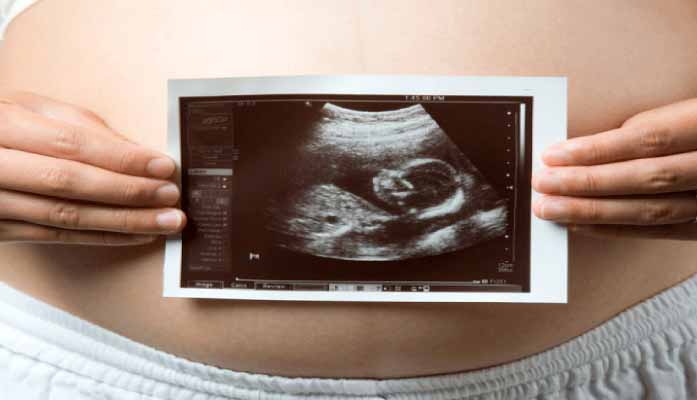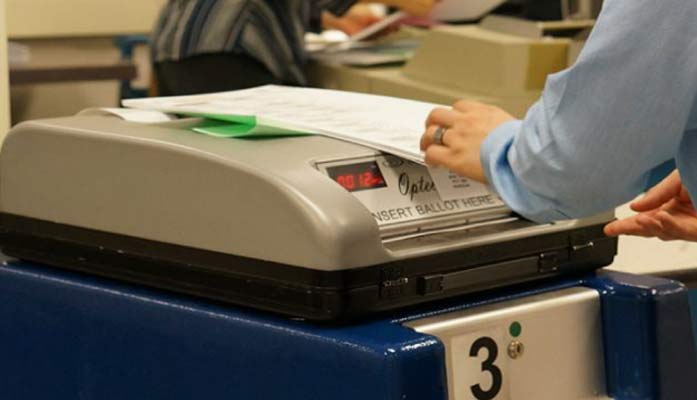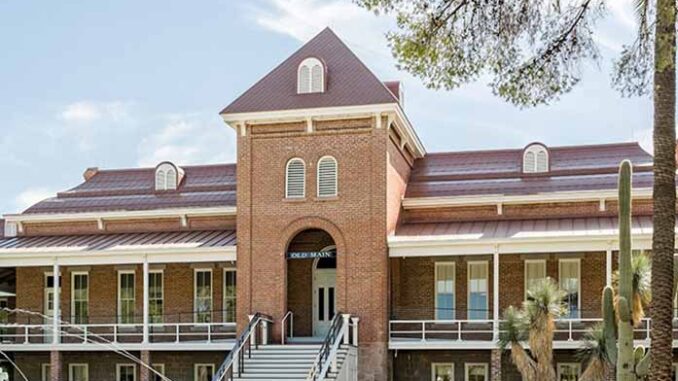
by Corinne Murdock | Mar 15, 2023 | News
By Corinne Murdock |
This week, Gov. Katie Hobbs departed for Oman to officiate a pact made under the former administration with the Middle Eastern country.
In a press release, Hobbs said that the partnership provided greater readiness for Arizonan forces. Oman has a population of nearly four million people, bordering Saudi Arabia, the United Arab Emirates, and Yemen. The partnership formed under former Gov. Doug Ducey last October.
“This partnership is grounded in our Arizona National Guard military relationship but expands to other sectors of the government bringing valuable interoperability opportunities for both countries,” said Hobbs.
Kerry Muehlenbeck, Arizona National Guard adjutant general and Department of Emergency and Military Affairs director, added that the partnership would strengthen both country’s forces.
The Arizona National Guard established the partnership last October through the Department of Defense National Guard Bureau State Partnership Program. The program partners states with nations in order to bridge international civil-military affairs; over 90 nations have a match in the states. This year marks the program’s 30th anniversary.
Arizona partners with one other country through the program, the Republic of Kazakhstan, a relationship it has held since 1993.
Daniel Hokanson, chief of the National Guard Bureau, said that the program also allows soldiers to visit other countries and understand problem-solving skills from foreign soldiers.
“To look at the environment that they operate in, and to really see, in many cases, the same problems — just approached from a different angle,” said Hokanson. “We learn a lot in those countries and in those interactions that we bring back to make our organizations better, and I like to think vice versa.”
Several days after announcing the partnership, the University of Arizona (UArizona) Eller Executive Education announced a partnership with the Royal Academy of Management in Oman for a program, “Developing Leaders and Future Foresight.” Although the press release was issued several days after the state announced the National Guard partnership, UArizona’s initial press release was dated for the same day as the state’s announcement.
UArizona’s partner program with Oman is designed to develop and equip national leaders to fulfill Oman’s “Vision 2040,” a plan to become a developed country by 2040.
Oman is one of the top oil exporters. They also export liquified natural gas.
Hobbs attended the formal signing ceremony on Monday, and is scheduled to depart from Oman on Wednesday. Oman leadership is scheduled to visit Arizona in May.
Corinne Murdock is a reporter for AZ Free News. Follow her latest on Twitter, or email tips to corinne@azfreenews.com.

by Corinne Murdock | Mar 14, 2023 | News
By Corinne Murdock |
Two GOP lawmakers will defend the state’s ban on abortions due to fetal genetic abnormalities, since Attorney General Kris Mayes refuses.
House Speaker Ben Toma (R-LD27) and Senate President Warren Petersen (R-LD14) were granted permission to defend the law by U.S. District Court Judge Douglas Rayes last Thursday. Alliance Defending Freedom (ADF), a Scottsdale-based Christian legal advocacy group, is representing Toma and Petersen in the case, Isaacson v. Mayes.
Rayes determined that Toma and Petersen were qualified to intervene because they had significant protectable interest in the case. The pair requested to intervene in February, following Mayes informing the court that she no longer wished to represent the state in this case. Mayes told multiple news outlets just days into her administration that she wouldn’t defend or uphold the state’s existing abortion laws.
“Arizona has made a policy decision to vest in its legislative leaders an interest in defending the constitutionality of the legislature’s enactments,” stated Rayes. “If [Toma and Petersen] are not permitted to intervene, the challenged laws will go undefended, which ‘risk[s] turning a deaf ear to the voices the State has deemed crucial to understanding the full range of its interests.’”
Throughout her campaign and in her first few months as attorney general, Mayes characterized the contested abortion ban as “unconstitutional” and in violation of Arizona’s privacy clause, promised to not prosecute abortionists in violation of law, and vowed to use her authority to prevent county attorneys from enforcing abortion restrictions and bans.
“Intervention is even more appropriate here, where the Attorney General’s interests are directly contrary to those of the proposed intervenor,” stated ADF’s petition.
As AZ Free News reported last week, Mayes revealed that her office has even been encouraging pharmacies to give out abortion pills.
A.R.S. § 12-1841 allows legislative leaders to intervene in cases challenging the constitutionality of state statutes. Last year, the Supreme Court (SCOTUS) upheld the legality of state laws like Arizona’s.
Abortionists Paul Isaacson and Eric Ruess; the National Council of Jewish Women, Arizona section; Arizona National Organization for Women; and Arizona Medical Association sued the state over the abortion ban in August 2021. The ban, codified through SB1457, prevents a woman from terminating her pregnancy due to the presence of any fetal genetic abnormalities, like Down Syndrome.
SB1457 argued that the state had three compelling interests in outlawing selective abortions: protecting the disability community from discriminatory abortions; protecting citizens from coercive medical practices encouraging selective abortions based on genetic abnormalities; and protecting the integrity and ethics of the medical profession by preventing doctors from becoming witting participants in genetic-abnormality-selective abortion.
READ THE ABORTION BAN HERE
Last July, the court ruled that the law’s recognition of the personhood of unborn children was unconstitutionally vague and in conflict with other state laws.
The state legislature is working on passing additional abortion regulations and restrictions. SB1600 from State Sen. Janae Shamp (R-LD29) provides protections to infants born alive from a botched abortion. According to the Arizona Department of Health’s (AZDHS) latest data, at least nine babies were born alive following a botched abortion procedure in 2021. The Senate passed Shamp’s bill along party lines last month.
SB1146 from State Sen. Jake Hoffman (R-LD15) would require the State Board of Investment to identify companies that donate to or invest in organizations that promote, facilitate, or advocate for abortions for minors or for the inclusion of or referral of K-12 students to sexually explicit material. The Senate passed the bill earlier this month, also along party lines.
Corinne Murdock is a reporter for AZ Free News. Follow her latest on Twitter, or email tips to corinne@azfreenews.com.

by Corinne Murdock | Mar 12, 2023 | Education, News
By Corinne Murdock |
Parents can now call a hotline to report inappropriate lessons at their schools, under a new initiative launched by the Arizona Department of Education (ADE) on Tuesday.
Superintendent Tom Horne discussed the hotline during a Wednesday interview on “The Mike Broomhead Show.” The superintendent said that teachers suspected of abusing their position may face disciplinary conduct and proposed that violations impact a school’s letter grade per the state’s A-F Accountability System.
“Teachers should be teaching the academic standards to their students and not abusing a captive audience by pushing their own ideology,” said Horne. “If they know that their kids have been taught those things, we want them to let us know so we can investigate it and try to do something about it.”
In a press release, ADE clarified that inappropriate public school lessons included those that focus on race or ethnicity, rather than individuals and merit; promoting gender ideology; social-emotional learning (SEL); or inappropriate sexual content. The department linked to our report documenting the over 200 educators who signed onto a statement proclaiming that they would teach outlawed materials like Critical Race Theory (CRT) – even if banned.
Anti-school choice activists and critics of Horne encouraged parents to flood the hotline, dubbed the “Empower Hotline.” Save Our Schools Arizona issued a call to action to drown out real reports from parents seeking help.
“[Please] report how amazing it is that teachers are doing so much for our kids despite the lack of resources provided to them,” stated SOSAZ.
The Empower Hotline rollout included a link to a page on the ADE site explaining Critical Race Theory (CRT) and Social-Emotional Learning (SEL).
ADE claimed that CRT is being taught in many public schools, and rejected the claim that it’s a college-level curriculum. ADE published a list of key words and phrases associated with CRT: oppressors or oppressed, whiteness, white privilege, white supremacy, white complicity, white equilibrium, and white fragility.
“The claim that CRT or its principles and elements is not part of any school curriculum in Arizona is false. It is being taught to children,” stated the ADE.
ADE also characterized SEL as a gateway for CRT. The department also claimed that SEL took away precious instructional time by focusing on emotions and feelings.
“Student test scores have been declining since before the pandemic, and resources – especially the non-renewable resource of time – need to be spent to fully educate students in core subjects,” stated ADE. “Teachers are professionals. They know their students and are already trained to be alert for signs of emotional and behavioral problems. This doesn’t require a full-blown curriculum that detracts from teaching academics.”
Horne warned in a statement that CRT can be taught under different titles, such as “power diversity” or “deep equity.”
Arizona Education Association (AEA) President Marisol Garcia called the hotline a “recipe for disaster.”
“Inviting the harassment of educators, without due process at their local level, with the ability of these ‘accusations’ to be FOIA’d?” asked Garcia.
Those seeking to file a report may call the hotline at (602) 771-3500 from 8:30 am to 4:40 pm, or submit an email to empower@azed.gov.
Corinne Murdock is a reporter for AZ Free News. Follow her latest on Twitter, or email tips to corinne@azfreenews.com.

by Corinne Murdock | Mar 12, 2023 | News
By Corinne Murdock |
On Tuesday, the Arizona Senate passed a bill requiring voting locations to tabulate early ballots on site.
The bill, SB1105, passed 16-14 along party lines. The bill initially failed in the Senate, but received a second chance on reconsideration. However, the legislation wouldn’t apply to counties that tabulate Election Day ballots at a central location, and those that don’t otherwise tabulate Election Day ballots on-site at a polling location or voting center.
SB1105 from State Sen. Frank Carroll (R-LD28) modifies law to require rather than merely allow county officers in charge of elections to tabulate a voter’s early ballot on site on election day.
Officials who voiced opposition for the bill included Pima County Recorder Gabriella Cazares-Kelly, Mohave County Supervisor Jean Bishop, Mohave County Assessor Jeanne Kentch, and County Supervisors Association of Arizona Legislative Director Robin Hillyard.
During the Senate Elections Committee hearing on the bill in January, Senate Majority Leader Sonny Borrelli (R-LD30) called the legislation a “great, great bill” that “helps with accuracy.” Senate Assistant Minority Leader Juan Mendez (D-LD08) questioned what was more important: accuracy or speed. Borrelli responded that voting was a privilege worth waiting in line for, comparing voting lines to those lines people endure for things like movies and Disneyland.
“You can wait to stand in line, but you can’t wait for the election results to come out when they’re just going to come out?” asked Mendez.
“I’ve always advocated for accuracy, not speed,” said Borrelli.
Jen Marson, Arizona Association of Counties, said that her organization opposes the bill, calling it “unimplementable.” Marson relayed that only half of the counties in the state tabulate ballots on site. She questioned whether the bill would require all counties to tabulate on site.
The committee hearing preceded the amended version of the bill that passed the Senate on Tuesday, which included the exemption for counties that tabulate Election Day ballots at a central location.
Marson further warned that two separate polling places would have to be run within each location: one side for early ballot turn-ins, and one for on-site tabulation. She projected that not all locations would have enough space to run this size of operations. With that, Marson noted that counties would be required to have two separate boards, staff, and equipment to oversee these separate polling place operations.
In addition, Marson noted that it was difficult to find voting locations that are big enough and are ADA compliant. State Sen. John Kavanagh (R-LD03) pointed out that schools and churches are big enough and are ADA compliant, but Marson disclosed that counties are often told “no” by schools.
Marson questioned whether everyone would be required to stand in line rather than drop off an early ballot, and noted that there would need to be different tabulators for early ballots versus in-person, day-of ballots.
Democrats in the committee called the bill “problematic” and a “logistical mess.”
State Sen. Anna Hernandez (D-LD24) claimed that the bill would disenfranchise voters by requiring them to take the time to have their early ballot tabulated on site. Mendez concurred with Hernandez’s remarks, adding that it would make it harder for certain, undisclosed populations to vote.
State Sen. Ken Bennett (R-LD01) admitted that the bill was flawed but ultimately had good intentions. He voted for it in the hopes that the language would be cleaned up to address Marson’s warnings.
“If people are going to bring their early ballots to the polls, then show ID and let’s get those counted. But, half of the counties literally do not do tabulation at these voting centers. This bill is attempting to do something by striking the very language that gives the counties the flexibility, who don’t do on-site tabulation, to send it in and count it,” said Bennett.
These issues were addressed in an amendment on the bill, which provided the exemption for counties that tabulate Election Day ballots at a central location, and those counties that don’t otherwise tabulate Election Day ballots on site at a polling location or voting center.
Corinne Murdock is a reporter for AZ Free News. Follow her latest on Twitter, or email tips to corinne@azfreenews.com.

by Corinne Murdock | Mar 11, 2023 | Education, News
By Corinne Murdock |
A committee formed by University of Arizona (UArizona) faculty disbanded this month after they felt university officials were unsupportive of their efforts.
In a letter explaining their disbandment, the General Faculty Committee on University Safety For All informed Faculty Chair Leila Hudson and Faculty Vice Chair Mona Hymel that they feared negative repercussions if they continued their investigative efforts. Hudson had created the committee.
The committee issued a 30-page interim report in January claiming that UArizona suffers from “a glaring institutional failure” that compromises campus safety, and further accused the university of disregarding employee and student safety concerns. The committee’s primary focus on the report was the slaying of professor Thomas Meixner last October.
The accused killer, 46-year-old Murad Dervish, was denied a teaching assistant position for this spring semester by Meixner. Dervish initially sought out three other professors though he wasn’t able to locate them. The report documented Dervish’s lengthy criminal history prior to UArizona, as well as the timeline of his aggressive and predatory behavior leading to his expulsion and ban from campus.
“University officials knew about the prevalence of such violence risks but did not take necessary action to protect the victims,” stated the committee report.
The report also documented three other, unrelated cases to prove UArizona suffered from institutional failures compromising campus safety. These cases documented the alleged harassment and sexual misconduct of two male law students against two female law students; the doxxing and harassment of a female student reporter; and the police call on a student over fallout with a faculty member.
The committee further accused UArizona of suffering from a “chronic trust problem,” calling into question the competency and integrity of university administrators, the university’s capacity and willingness to address safety, and the imposition by administrators of a climate of retaliation and consequences.
The spokesman for UArizona issued a response to media outlets alleging that the committee’s work was based on “misleading characterizations and the selective use of facts and quotations.”
In order to cultivate its data, the committee engaged in one-hour listening sessions with four minority groups, and three faculty groups.
The Faculty Senate endorsed the report during a meeting last month.
The committee formed several weeks after the fatal shooting of Meixner last October.
UArizona hired consulting firm PAX Group to review and issue a report on their campus safety protocols. That report has not yet been publicized. The faculty committee was slated to issue a final report later this semester.
Members of the faculty committee were Chairwoman Jenny Lee, College of Education; Hoshin Gupta, College of Science; Jennifer Hatcher, College of Public Health; Luis Irizarry, graduate student liaison; Lisa Kiser, College of Nursing; Barak Orbach, College of Law; Christina Rocha, staff liaison; Shyam Sunder, Eller School of Management; and Lauryn White, student liaison.
Corinne Murdock is a reporter for AZ Free News. Follow her latest on Twitter, or email tips to corinne@azfreenews.com.





